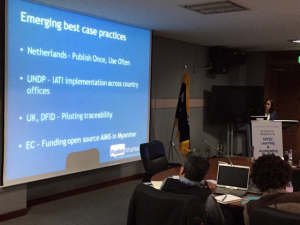Reflections on the Annual GPEDC Workshop in Seoul, Korea
Last week well over 100 participants convened in Seoul for the Annual Workshop of the Global Partnership for Effective Development Cooperation organised by the Korean government.
 The main objectives of the workshop were to take stock of the implementation of the Busan commitments at country level and to reflect on the role of the GPEDC going forward, particularly in the context of the Post-2015 Development Agenda.
The main objectives of the workshop were to take stock of the implementation of the Busan commitments at country level and to reflect on the role of the GPEDC going forward, particularly in the context of the Post-2015 Development Agenda.
It’s difficult to summarise all that transpired in a week packed with discussions on diverse aspects of development – from the role of the private sector to the use of country systems. Overall, it was a great opportunity to get a glimpse of how global commitments are being translated at the country-level.
Here are my main takeaways on what needs to happen to ensure the continued relevance of the GPEDC in the Post-2015 context.
Get monitoring right
If the monitoring framework is to be one of the biggest contributions of the GPEDC to the Post-2015 process, as most participants in Seoul agreed it should be, then it is important to get it right. There was a refreshingly candid discussion around the pilot indicators and the limitations in the first round of the monitoring process in last week’s meetings.
Clearly, the next few months will be crucial in addressing some of these issues. It is important that the principles of transparency and accountability are embodied both in the process and the output of the monitoring efforts.
The Indicator on transparency needs to retain the fundamental principles established in Busan and reflect the demands of partner countries for timely and forward looking data. For the exercise to be effective, the process for agreeing indicators and the underlying methodology for assessment needs to be multi-stakeholder so that the refined indicators reflect the development needs of all stakeholders.
Equally important will be to ensure that all the underlying disaggregated, raw data used for measuring the results is made publicly available. This will allow for the identification of specific areas of non-delivery by specific actors and help move the emphasis of the findings from “the glass being half full” to “who needs to do exactly what to fill the rest of the glass.” Ultimately, any monitoring exercise needs to incentivise behaviour change and provide the evidence-base for reforms in order to be effective.
Move from rhetoric to action
Even as the monitoring framework is being fine-tuned and improved upon for the next round of assessment leading up to the second High-Level Meeting of the GPEDC in 2016, it is imperative that development partners make concerted efforts to meet their existing commitments. Most of the indicators of the monitoring framework include very clear targets for the end of 2015.
Yet, with just over a year to go, there is very little to show in the way of achievements and we are looking at a real possibility of missing most of these targets. Particularly concerning for us is the slow progress on transparency, despite the commitment made by donors to implement the IATI standard which provides a flexible framework for publishing information on development cooperation.
As many of the big improvers and fast movers in the 2014 ATI demonstrate, change is possible over relatively short periods of time and excuses from those who are failing to deliver on these commitments now simply ring shallow. Without the full picture of what providers are doing where, how and with whom, progress on several of the remaining indicators of the monitoring framework will continue to be difficult to assess and achieve.
Create better platforms for lesson-sharing
One of the highlights of the Seoul meeting was the presentations from a wide range of partner countries and development providers on what has worked in their contexts.
 There are some excellent best case practices and success stories emerging on the supply and use of data – Myanmar’s new open-source and home-grown AIMS, country-level monitoring efforts in Vietnam, transparency tools and IATI implementation in Finland and Sweden and many more.
There are some excellent best case practices and success stories emerging on the supply and use of data – Myanmar’s new open-source and home-grown AIMS, country-level monitoring efforts in Vietnam, transparency tools and IATI implementation in Finland and Sweden and many more.
Although showcasing these efforts open up possibilities for change for others, much more is needed in terms of lesson sharing if these efforts are to be adapted and transferred to different contexts. Questions such as “how much did it cost?”, “how long did it take?”, “what other enabling factors played a role?”, “what were the challenges and how were they overcome?”, or indeed “what were the failures?” are the most interesting ones for learning and there was little time to address these questions fully last week.
If the GPEDC’s role as a facilitating forum for such lesson sharing has to be realised, more and better platforms will need to be created. One option could be to create virtual platforms for ongoing sharing. The other is to ensure that future meetings allow for sufficient time and space to do delve deeper into some of the issues.
As the GPEDC defines it strategic vision and corresponding work plan it will need to start asking some difficult questions on the progress made to date or the lack thereof, hold members to account for non-delivery on commitments and communicate successes and failures better.
The road to 2015 cannot be paved with just good intentions.

